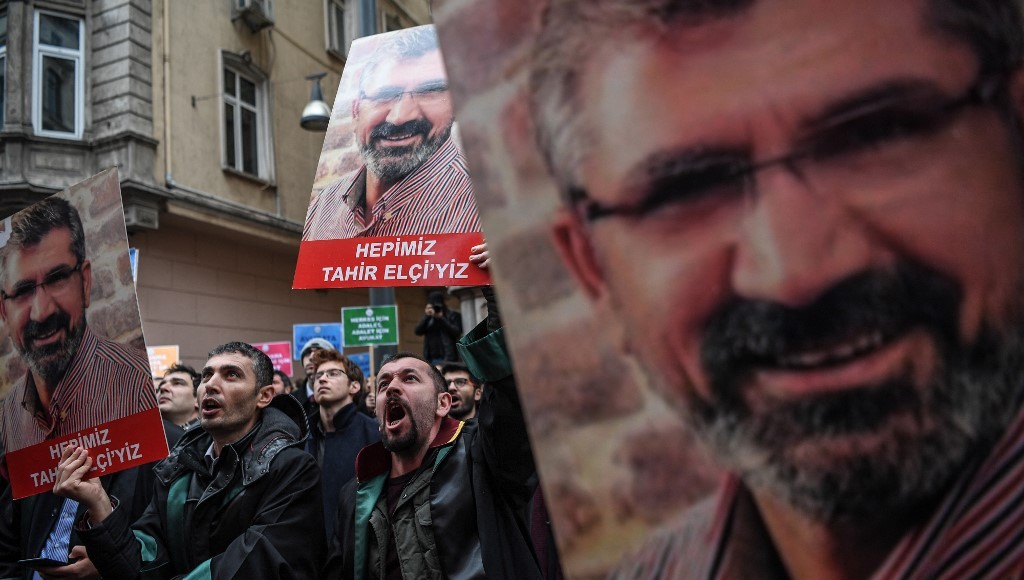A Turkish prosecutor is calling for the acquittal of three police officers accused of the murder of prominent Kurdish lawyer Tahir Elçi, claiming there is no credible evidence linking the officers to the crime.
Elçi, a vocal human rights activist and former chairman of the Diyarbakır Bar Association, was shot dead in November 2015 during a clash between police and members of the outlawed Kurdistan Workers’ Party (PKK).
The three officers, identified only by their initials, have been charged with “causing death by culpable negligence,” which carries a prison sentence of two to six years.
Elçi’s lawyers argue that the police investigation was flawed and evidence improperly collected and ignored. They also point to the lack of a crime scene investigation.
Elçi was shot dead in the Sur district of the southeastern Turkish city of Diyarbakır on November 28, 2015.
The case has since seen numerous twists and turns, with the latest development coming from the Diyarbakır 10th High Criminal Court.
The prosecution submitted a four-page brief to the court stating that conclusive and credible evidence against the officers, one of whom was fired from his job since then, could not be provided.
The prosecutor’s statement said that the lack of decisive forensic evidence and clear video footage of the moment Elçi was shot severely hampered the possibility of establishing a concrete link to the accused officers. The Council of Forensic Medicine (ATK) played a central role in the investigation, pointing out that it was impossible to medically or physically determine the trajectory or origin of the fatal shot.
Both the ATK and the Scientific and Technological Research Council of Turkey (TÜBİTAK) pointed out faults with the evidence in their reports, including a 12-second gap in the surveillance footage that could have captured the decisive moment of the shooting. These problems with the evidence have fueled ongoing debate and criticism of the handling of the investigation.
The case also involves allegations of evidence tampering. One witness, Mehtap Altuğ, claimed in a 2016 investigation that key DNA evidence that could potentially identify the shooter was deliberately removed from the file on the instructions of senior officials at the ATK.
The prosecutor’s recent plea for acquittal on the grounds that there was no clear evidence marks another twist in the case.
In 2021 witness Deniz Ataş, who initially accused the PKK of Elçi’s murder, retracted his statement, claiming he was pressured by authorities to testify falsely.
Ataş also alleged that he was subjected to torture, leading him to implicate the PKK.
He said he was arrested in Diyarbakır’s Sur district, where Elçi was murdered, following the incident in 2015 and subjected to torture to put the blame on the PKK for the lawyer’s murder.
Fugitive Uğur Yakışır, an alleged member of the PKK, is charged with “murdering Tahir Elçi and two police officers [who died the same day],” facing multiple life sentences and an additional 45 years in prison. Another PKK member, Mahsum Gürkan, who was also allegedly involved in the murder, was later killed during clashes with military forces in the Southeast.
Ataş also wrote a letter to the Diyarbakır Bar Association in which he explained how he was pressured by the prosecutors to give a false statement against the PKK. He said he does not know Yakışır or Gürkan and whether they were involved in the murder of Elçi, in contrast to what he said at the beginning of the trial.
Meanwhile, the prosecutors who are accused of witness tampering were promoted to higher courts by the HSK.
Elçi’s lawyers argue that during the investigation, evidence in the case was inadequately collected. Despite requesting the questioning of certain police officers and officials, pointing out the lack of a crime scene investigation, their requests were rejected.
According to a 2021 report from Forensic Architecture, a London-based multidisciplinary research group, the indictment concerning the killing of Elçi that charges a Kurdish militant with murder is not realistic.
The researchers said Turkish prosecutors holding a PKK member responsible for Elçi’s murder was problematic, saying their findings clearly showed he could not have killed Elçi.
The group had earlier investigated the controversial case at the request of the Diyarbakir Bar Association and released a report in 2019.
After a process of elimination, the report concluded that the prominent Kurdish human rights defender was most likely killed by one of three police officers present at the scene.
Calling for a peace rally on what turned out to be the day of his death in Sur’s historic district, Elçi said he wanted no violence, war, destruction or armed operations in the area moments before his murder.



